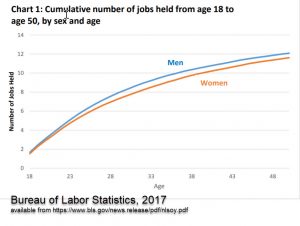1979
Frequent job changes are common today, but holding many jobs over the course of one’s adult lifetime has actually been common for quite some time.
While a snapshot of any given point in time is helpful, a longitudinal consideration of a given cohort across time paints a more complete picture of job changes. The Bureau of Labor Statistics reported findings from the National Longitudinal Survey of Youth 1979, which is a survey of nearly 10,000 men and women who were aged 14 to 22 when first interviewed in 1979 and aged 49 to 58 when interviewed most recently in 2014-15. Among this group of baby boomers, the average number of jobs held between age 18 and age 50 was 11.9. Notably, however, 5.5 (46.2%) of these occurred between the ages of 18 and 24.
20 in 20
I am not a baby boomer. I am part of Generation X.
Since graduating college with my bachelors degree in 1998, I’ve held a total of 20 jobs in 20 years.
This number includes a few employers where I had multiple jobs as a result of promotions, including holding three positions for one employer and two positions for three different employers. Together these experiences account 45% of all positions.
This number includes three roles that had interim in the job title or were otherwise intentionally short-term. It also includes multiple stretches of time during which I held multiple jobs.
During this 20 year period I also continued my educational journey earning two masters degrees and a doctorate. Additionally, this stretch of time includes a fellowship.
So What?
There is plenty of literature available showing that frequent job changes are more common in certain fields than others. And, there are many interesting assumptions about how Millennials are changing the workplace and how their early patterns of job change may (or may not) continue as they age. Of even greater interest to me is the likelihood of a future where fewer people work as increased automation, artificial intelligence, and other advances lessen the need for human labor.
Regardless of how frequently you have changed jobs or think you will change jobs in the future, some level of awareness of the normalcy of such shifts is helpful. And, for those who lead congregations and other religious communities some consideration of what these changes mean for those experiencing them as well as for the life of the community of faith.
- What does your congregation offer to people who are entering or exiting the life of your community of faith because a job change includes a geographic relocation? What changes or additions to the current approach might be beneficial for newcomers and for those who are leaving?
- What does your congregation offer to people who are active participants in your community of faith who seek to continue such a role during a season of personal change (whether due to a change in jobs or other life changes)? What are some examples of intentional ways your congregation encourages folks to share their life transitions, and what are some examples of ways such transitions are supported?
